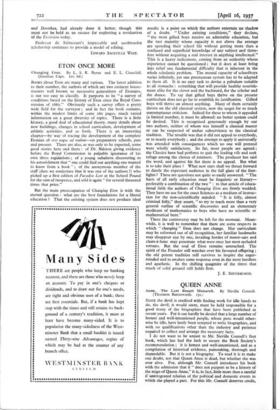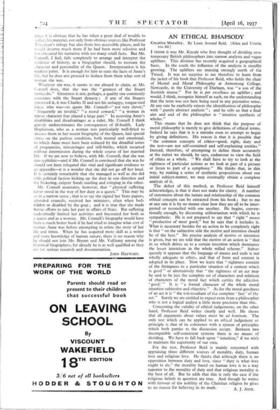QUEEN ANNE
SINCE the devil is credited with finding work for idle hands to do, the devil, it would seem, must be held responsible 'for a good many of the biographies that have been published in recent years. For it can hardly be denied that a large number of honest and well-intentioned people, whose pens would q:)ther- wise be idle, have lately been tempted to write biographies, and with no qualifications other than the industry and patience required to collect and arrange the necessary facts.
I do not want to be unjust to Mr. Neville Connell's first book, which has had the luck to secure the Book Society's recommendation ; it is honest and well-intentioned, and as a compilation of historical evidence, painstaking, thorough and dependable. But it is not a biography. To read it is to make one doubt, not that Queen Anne is dead, but whether she was ever alive. For, although Mr.' Connell introduces his book with the admission that it " does not purport to be a history of the reign of Queen Anne," it is,in fact,. little mare than a careful if unintegrated relation of the political and domestic events in which she played a part. For This Mr. Connell deserves credit, sine it is obvious that he has taken a great deal of trouble to collect his material, not only from obvious sources like Professor Trevelyan's trilogy but also from less accessible places, and he would deserve much more if he had been more selective and not obscured his narrative with too many small facts. But Mr. Connell, I feel, fails completely to arrange and interpret the evidence of history, as a biographer should, to recreate the character and personality of the Queen. Interpretation is his weakest point. It is enough for him to state the facts of Anne's life, but he does not proceed to deduce from them what sort of woman she was.
Whatever she was, it seems to me absurd to claim, as Mr. Connell does, that she was the " greatest of the Stuart monarchs." Greatness is not, perhaps, a quality one commonly associates with the Stuart dynasty ; if any of the Stuarts possessed it, it was Charles II and not his unhappy, tongue-tied niece, who was—to quote Mr. Connell—" not very clever," " frequently an invalid," " a moral coward," " a woman in whose character fear played a large part." In assessing Anne's disabilities and disadvantages as a ruler, Mr. Connell I think gravely underestimates the consequences of ill-health. Lady Hopkinson, who as a woman was particularly well-fitted to discuss them in her recent biography of the Queen, laid special stress on the parlous condition, both mental and emotional, to which Anne must have been reduced by the dreadful series of pregnancies, miscarriages and still-births, which recurred without intermission during the whole course of her married life. If we are now to believe, with Mr. Connell, that she was also syphilitic—and if Mr. Connell is convinced that she was he Should not have relegated this vital and significant evidence to an appendix—it is a wonder that she did not go off her head. It is certainly remarkable that she managed as well as she did with political faction kicking up the dust in one direction and the bickering, exigent Sarah snarling and cringing in the other.
Mr. Connell maintains, however, that " physical suffering never stood in the way of her duty as a queen." This may be so in a narrow sense ; that is to say she signed her State papers, attended councils, received her ministers, often when bed- ridden or disabled by the gout ; and it is true that she made seroic efforts to take her part in affairs of State. But suffering undoubtedly limited her activities and frustrated her both as a queen and as a woman. Mr. Connell's biography would have been a much better book if he had tried to imagine what sort of woman Annie was before attempting to relate the story of her lire and times. When he has acquired more skill as a writer and more knowledge of human nature, there is no reason why he should not join Mr. Bryant and Mr. Vulliamy among the historical biographers, for already he is as well qualified as they are for serious research and documentation.
- JOHN HAYWARD.























































 Previous page
Previous page